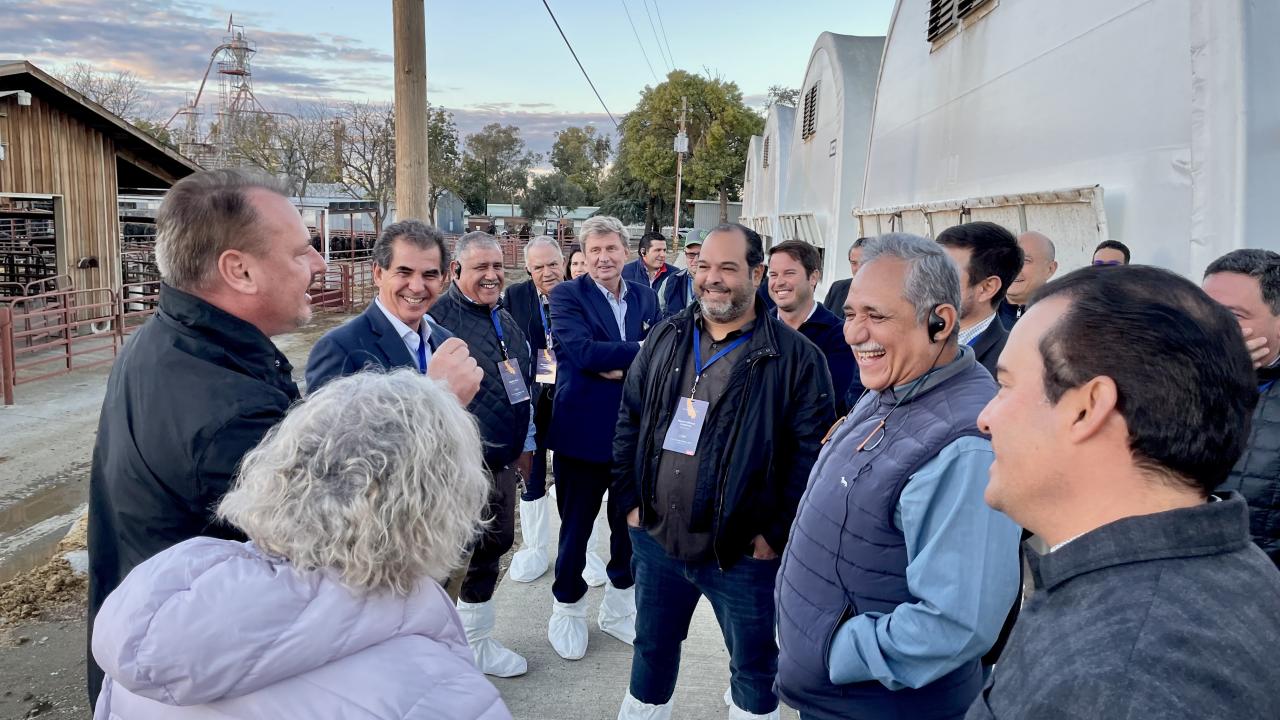
Mexican cattlemen visit UC Davis CLEAR Center for Zoetis Mexico Sustainability Summit
A delegation of feedlot owners from Mexico came to UC Davis in early November for a sustainability summit with the UC Davis CLEAR Center and Zoetis Mexico. These feedlot owners represented nearly two million head of cattle amongst them. Over two days scientific experts presented the most cutting-edge sustainability science to this group in search of ways to improve their operations.
Keynote speaker, Dr. Frank Mitloehner, instilled in the group that the methane from their herds is only a liability if it is not managed. When methane is managed, through technologies like feed additives or manure digesters, it can help fight climate change. He charged the group with working with scientists in their regions to figure out how to manage methane based on their unique conditions.
The professor and air quality specialist stressed that efficiency is environmentally friendly, because producing more with less makes optimal use of resources. It also makes economic sense. Even in the absence of policy incentives, if producers can be more efficient it will still save them money. These savings can quickly add up to pay for implementing new technologies that are also good for the environment.
“Your customers will want to know what you are doing is sustainable,” Dr. Mitloehner said. “You need to show you care and you need to tell your story, based in fact.”
The audience was highly engaged. There were many questions about soil carbon sequestration, methane regulation and reduction, as well as how California dairy farmers have been able to partner with California to implement dairy digesters. They were very interested in the carbon market model used in California and the possibility to generate renewable natural gas from manure.
Dr. Frank Mitloehner presents on heat stress mitigation in cattle
Given the already hot climate of Mexico and the potential for it to become even hotter due to global warming, the group was interested in learning more about Dr. Frank Mitloehner’s work in reducing heat stress in feedlot cattle.
Cattle do not do well during extreme heat. They eat less when they are heat stressed and produce meat of poorer quality. This is a problem for animal welfare and the bottom line. We want cattle on feed to be eating and gaining well. Dr. Mitloehner presented his previous work on shade structures and dust reduction to optimize welfare, maintain performance and minimize conflicts with neighbors.
The group was highly engaged and asked many questions regarding how to optimize shade, manage flies, wastewater recycling with vermifiltration, and cattle behavior. Dr. Mitloehner pointed out that determining what types of shade structures work best for Mexican conditions is ripe for scientific research and encouraged these feedlot owners to work together with scientists in Mexico to run shade experiments on their lots.
Day two presentations focused on animal welfare and efficiency impacts on sustainability
Dr. Temple Grandin provided a pre-recorded conversation with Jason McAlister, Executive Director of Cloverleaf Animal Welfare systems. They spoke about cattle behavior and working with animals to reduce stress and increase safety. Understanding the physiology of cattle, and seeing things through their eyes helps feedlot owners to design more effective systems of managing cattle, which keep workers and animals safe. When workers and animals are safe, meat is high quality and resources are not lost.
McAlister presented the importance of workers to knowing the values of the feedlot on which they work. If owners and managers train on animal welfare and engrain the importance of proper animal handling and welfare practices employees will feel empowered to do the right thing and weed out bad actors. Animal welfare isn’t just the right thing to do. Treating animals with respect through their lives and their deaths produces higher quality meat.
He gave insights in to animal behavior and how to minimize aspects of the sorting, transporting, and slaughtering process to keep animal stress low. When animals are stressed lactic acid builds in their bodies, producing a lower quality meat. If they are mishandled and it leads to bruising this is also a quality issue in the final product. Taking cattle behavior into account can minimize opportunities for injury or stress.
Dr. Gabriele Maier presents the Beef Quality Assurance Program
Dr. Maier, is a veterinarian and assistant specialist in cooperative extension at the UC Davis School of Veterinary Medicine and an expert in beef cattle herd health and welfare. Her focus is management of infectious disease and beef quality assurance and food safety. She presented the Beef Quality Assurance Program (BQA), a national program that raises consumer confidence through offering proper management techniques in the beef industry, as a model for maintaining quality throughout the beef supply chain.
The program has many resources to train employees and managers on best practices for a range of needs, from biosecurity, safe animal handling, to routine care. This program ensures the highest levels of animal welfare to produce the best quality beef with the least waste due to disease, injury or mishandling.
Beef Nutrition and Sustainability in Feedlot Cattle
Dr. John Beckett, a feedlot nutritionist and former UC Davis Animal Science graduate, described all the latest feeding and monitoring technology to maintain animal health and increase yield. Efficient production saves resources.
“We’ve improved water use in beef production by 29% in the last 20 years,” said Dr. Beckett.
Various factors, weather being a big one, means we can see bigger gains and more efficiency in beef cattle raised in California. It takes 10% less corn to feed a steer in California to the same weight than it does in Texas.
“I would put our production in California against anyone,” said Dr. Beckett.
Dr. Beckett reminded the audience that sustainability so much more than capturing methane. True sustainability means an economically viable operation, reduced environmental impacts through efficiency and new technology, and meeting societal concerns, like those around animal welfare.
